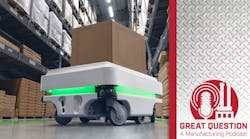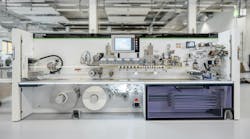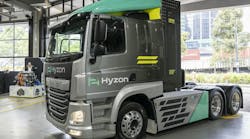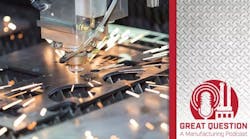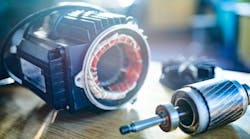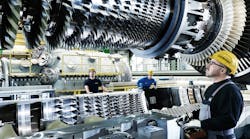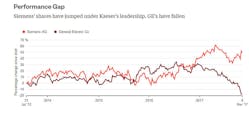Author: Chris Bryant
One justification for industrial conglomerates is that expertise (technological or regulatory) from one part of the group can inform decisions in another. A second is that having diverse businesses helps if one runs into trouble.
Siemens AG's earnings update on Thursday was a reminder of why these arguments often don't hold water. An otherwise good set of yearly results was marred by simultaneous troubles at its wind and fossil-power divisions. Understanding renewables doesn't seem to have helped the German giant fully grasp the negative consequences caused by their arrival.
Luckily, Siemens seems to have learned its lesson and is ditching a rigid conglomerate structure. Arch-rival General Electric Co. should think about doing the same.
Under chief executive Joe Kaeser's leadership, Siemens is much better run these days. The stock has risen more than 50% during his four-year tenure, as Kaeser sold non-core units and eradicated one-off charges. Net profit has risen about 40%.
Blotting his copybook are two businesses related to power generation. Siemens's wind unit, recently merged with Spain's Gamesa, lost money in the most recent quarter and is slashing 6,000 jobs. Its power and gas division is poised for similar. Siemens hasn't said how many jobs will be lost from its gas turbine factories, but it'll be more than a handful. Profit has slumped at both Siemens and GE's fossil-power divisions.
Intuitively, this makes no sense. The old narrative on the transformation of energy markets went something like this: Dirty coal power plants will gradually be displaced by wind and solar, with gas turbines providing "cleaner" electricity at night and when it's not windy. So Siemens's wind and gas turbine units should both be doing well, right?
Things haven't been quite so simple. While companies are producing more clean power, we're consuming less. Household electricity consumption has started falling in Europe and the U.S.
Renewables depress wholesale electricity prices, making it uneconomical for utilities to operate gas-fired power plants. Underused gas turbines don't need as much lucrative maintenance work and their role as backup power providers is threatened by battery storage. The large gas turbine market is almost two-thirds smaller than Siemens and others expected in 2010. German utilities have ordered only two turbines in the past three years, Mr. Kaeser noted. Competition is fierce, pushing down prices.
And what of wind? Shares in market leader Vestas Wind Systems A/S plunged by 20% on Thursday because a shift toward auction-based tenders is hurting prices -- something Siemens Gamesa Renewable Energy SA flagged too. Plus there's Donald Trump, who's doing his darnedest to roll back wind power subsidies.
In fairness, Siemens has warned about its fossil-power troubles for years. Still, a globe-spanning conglomerate that can arrange a meeting with a president at the drop of a hat, should be better at spotting technical and regulatory shifts. Within a sprawling group, poorly-performing units can hide behind the success of others.
To make Siemens nimbler, Kaeser is moving toward more of a holding structure. The wind business has a separate listing, the train unit will have one if a merger with Alstom SA is approved and the healthcare division is poised for an IPO. This doesn't mean they won't suffer from adverse markets -- Siemens Gamesa's start has been uncomfortable. But it does give a sharper focus and more accountability.
Investors seem to agree this is the right path. Siemens stock has far outperformed GE's in the past four years. "We've understood that old-fashioned conglomerates no longer have a future," Kaeser says. He's talking to you, GE.
